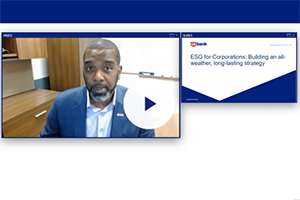An effective third-party administrator can accelerate fund launches, overcome back-office issues and streamline the administrative tasks for a growing PE shop.
As private equity (PE) shops scan the competitive landscape, they’re identifying new business opportunities.
Approaching previously untapped target markets and adopting broader distribution models, they’re appealing to a wider variety of individual and institutional investors hungry for alternative investments — which are proving increasingly attractive to investors given the low-yield, low-return outlook for traditional asset classes.
Turning to third-party support
To help navigate the regulatory requirements and develop effective processes and procedures, many PE fund operators are turning to third-party administrators to handle the non-core back-office tasks required of any fund offering. They are finding value in bank affiliated administrators to solve for banking services which include custody, loan servicing, credit lines, cash management and foreign exchange services. In addition, many private equity managers are launching retail products that are typically serviced by custodial banks.
“The outsourcing of fund administration service within the PE segment continues to increase as strategies become more mainstream among institutional investors,” says Dylan Curley, global head of business development at U.S. Bank Global Fund Services. “In addition, PE managers find themselves needing broader banking services for certain strategies, which may include custodial or lending arrangements. For certain PE strategies, including private credit, we are observing alternative clients launching registered 1940 Act funds. Managers are discovering that there are issues they need to resolve around compliance, distribution and other matters. So, they are finding it wise to partner with bank-affiliated administrators who not only service private and traditional fund structures, but also provide the full array of banking services that a manager may require.”
Expanding access to a market solution
To get ahead of the wave, many PE shops and larger multifaceted asset managers are taking a step that was virtually unheard of not long ago. They’re developing funds and registering them under the auspices of the Investment Advisers Act of 1940.
For years, in the interest of discretion, private equity fund sponsors sought to exclude their offerings from the rules of the 1940 Act. By limiting access to less than 100 investors and requiring that each investor meet high wealth thresholds, PE funds qualified for the exclusion and operated behind an opaque profile.
Such opacity, however, is no longer desirable for many firms.
Instead, a fund registered under the 1940 Act may:
- Take on more than 100 investors
- Discard requirements that an individual be a “qualified purchaser,” or someone with $5 million or more of assets
- Register shares for a public offering under the Securities Act of 1933, which also removes the “accredited investor” threshold of a net worth of $1 million or an annual income of at least $200,000
- Advertise the fund
- Offer access to individuals outside of its preexisting customer base
Casting a broader net certainly has its advantages in the asset-gathering realm, but it could also mean the addition of less-sophisticated investors, which could bring more scrutiny amid market ebbs and flows.
In such a fluid environment, ensuring that a fund is set up correctly in the first place is one of the best defenses for potential issues down the road.
“With a broader distribution, fund managers are seeing more and more investors seeking transparency across the board, in terms of valuations, how the manager calculates the carried interest and the general partner-limited partner split, as well as reporting returns in timely and accurate ways,” says Peter Mastriano, senior vice president at U.S. Bank Global Fund Services. “Whether it’s an accounting requirement, a presentation requirement or support for a fund structure, a PE firm needs to be prepared to meet the challenges in introducing a new product into a very complex and evolving marketplace.”
What goes into creating and maintaining a fund?
When inspiration strikes, innovation is quick to follow, especially within savvy PE shops that excel at discovering new and profitable market niches. Yet, converting a unique investment idea into a marketable fund offering — and subsequently handling the day-to-day maintenance of the fund — requires considerable behind-the-scenes legwork.
The back-office processes, which most asset managers strive to streamline as much as possible, require expertise across areas such as:
- Legal and regulatory matters: Every asset class has its own rules and regulations, and the complexity can expand exponentially with global strategies.
- Tax issues: Tax implications reside at the forefront of every investor’s mind, and as client roles expand, attention to taxing matters increases.
- Reporting: Reams of data, valuation challenges and regulatory requirements all factor into keeping clients apprised of their investments.
- Foreign exchange: A currency hedging strategy is only as effective as the planning and execution of the necessary transactions allow it to be.
- Counterparty considerations: Achieving optimal risk-adjusted returns hinges in part on minimizing risk variables on both sides of any transaction.
- Investor relations: Keeping current and prospective limited partners (LPs) engaged requires a tactful balancing act between portfolio companies, fund management and the investors themselves.
“At each of these steps it makes sense for a private equity manager to ask, ‘Do I really need to handle these functions in-house or can I partner with a third-party administrator, while at the same time satisfying investor demands?’” Curley says.
How does a third-party administrator add value?
Frequently, the decision to go outside the firm for back-office duties is a clear-cut business decision.
“Many times, it simply comes down to scale,” Curley says. “As private equity shops get larger and add more products, they typically don’t want to grow their own infrastructure. It will hit an inflection point where they don’t want the growth to drive costs higher and require additional technology and headcount.”
To ensure that a third-party administrator’s offerings make sense, the private equity shop should consider the outside party’s:
- Tenure and expertise: A third-party should have a handle on legal and regulatory requirements, as well as all of the steps needed to take a fund to market.
- Client service: From initial onboarding to ongoing needs, support should be high-touch but low-stress.
- Technology capabilities: Up-to-date systems should effortlessly handle all back-office chores, ensure stability and security, and possess the expansion capacity to meet the needs of a growing PE shop.
- Scalability: Along with technology, an outside firm should have the ability to ramp up all of its efforts as needed to support the PE shop’s growth.
- Access to other products and services: Beyond the fund-related business, a PE firm could benefit from a third-party’s full suite of offerings.
“Ultimately, it comes down to spending less time, money and resources on running the back office. This allows investment managers to focus on running the front office and investment management,” Mastriano says. “This means the PE shop is putting assets to work on those things that are drivers of performance, which is ultimately how they’re evaluated by investors.”
Why a bank is an ideal partner
A PE firm should focus on generating returns in an incredibly competitive environment, not tending to legal, compliance, technology and cash management matters. Those duties, however, are commonplace for banks, especially institutions with years of experience in partnering with investment firms.
For example, as one of the leading providers of fund administration services, U.S. Bank offers:
- Extensive legal, regulatory, custody, tax and compliance expertise and insights
- Sophisticated technology capabilities, including extensive redundancy, backup and disaster recovery infrastructure
- Seamless access to lines of credit and other financing facilities
- Reporting functionalities tailored to each client’s unique needs
- Client service teams well-versed in PE industry best practices
- Deep cash management capabilities to enhance performance while providing needed liquidity
- Experienced foreign exchange teams
- Wealth management resources
- Corporate banking coverage for portfolio or fund level financing
“U.S. Bank has the experience to handle a wide variety of structures and complexities, and when we partner with a PE firm with our core administration and other ancillary banking services, it helps get the fund off the ground quicker,” Curley says. “Our goal is to make the client experience a priority and ensure we have a dedicated and well-resourced team servicing our clients and their investors from the onset of the relationship. This commitment starts from the initial onboarding call, to the first capital call processed and throughout the life cycle of the fund. We do a very nice job of ensuring our clients understand the full value our organization can deliver to clients which can include our banking services such as credit lines, custody, liquidity management and foreign exchange. Being a full-service administrator to PE managers will definitely benefit them in the long run.”
Whether you’re currently evaluating the demands of launching a private fund or beginning to ponder a wider distribution of your offering, working with a bank-banked administrator to unburden some of your back-office responsibilities could prove valuable.
At U.S. Bank, we understand the value of partnering with a trusted third-party administrator to help you achieve your business goals, and we have the expertise and resources to support your private equity growth. To learn more about the comprehensive fund administration services offered at U.S. Bank, visit usbank.com/globalfundservices.












































